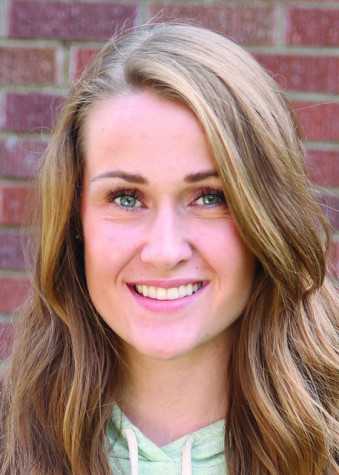Eating disorders can go unnoticed
National Eating Disorders Awareness week highlights multiple health risks
March 6, 2013
Editor’s note: We’ve corrected a date to reflect that Ruse over-exercised until February 2012.

Nicole Ruse was a guest speaker for Active Minds on March 1. Photo by Evan Sykes.
For the nearly 30 million Americans who suffer from eating disorders, aspects of everyday life such as balancing a healthy diet and regular exercise can be stressful.
In honor of National Eating Disorder Awareness Week, Active Minds hosted guest speaker Nicole Ruse March 1 to discuss her battle with binge eating and over-exercising.
Nicole Stearman, a member of Active Minds, organized the event.
“Active Minds is a non-profit organization all over the U.S. One of their programs is eating disorder awareness. I contacted Nicole because she used to go here, and we were friends. She came out with her story, and I thought it fit really well,” she said.
Ruse graduated high school in 2010 at the peak of her binge and compulsive eating disorder, reaching her highest weight of 310 pounds.
She enrolled at Eastern that fall and began to make some serious life changes.
“I started realizing I could go to the gym when I had friends who were in fast fitness,” Ruse said. “I was sick and tired of the way I felt, the way I looked, the way people perceived me. I just wanted to do something about it.”
She started going to the gym regularly in January 2011. “I started noticing results instantly. I didn’t really start working out too heavily to begin with, and just kind of went to the gym with my friends and had a good time,” she said.
Ruse incorporated a healthy diet into her new lifestyle, and by June she had lost 50 pounds.
“That was kind of the first moment where I realized, ‘Yeah, I can definitely go somewhere with this,’” she said.
She went home for the summer to Federal Way, Wash., where she joined a gym and kept up with her new healthy habits.
Ruse admitted she did not consult a doctor for the duration of her extensive workouts and drastic diet alterations.
“I started working out more and more, not realizing what I was getting into,” she said.
She returned to Eastern as a sophomore in September 2011, down a total of 120 pounds. Around the same time, her parents announced they were divorcing.
“I did anything and everything possible to numb that pain. I essentially just worked out as much as I could. I wasn’t seeing a doctor or anything, I wasn’t seeing a therapist. … I just kind of went to the gym. That’s what I was comfortable with. That’s what I wanted to do.”
In addition to spending two hours a day at the gym, Ruse said she also adopted an “extreme” eating regimen in which she cut out any foods she previously had enjoyed eating.
“I was very strict about my calories, very strict about every little thing I put in my mouth. … I stopped eating things I loved because I felt I wasn’t worthy of eating these things or enjoying the food I wanted to eat.”
By that winter, she was down 140 pounds and experienced a “breakdown” after she was denied excess skin removal surgery because it was too expensive.
“That just kind of ruined every thought I had about myself. I just kind of thought, ‘Well, what’s the point anymore?’ If I wasn’t able to get that body I always wanted, what was the point? So I went back to doing what I always knew, which was eating.”
Ruse found herself binge eating again. She would then over-exercise to compensate for the excess calories she had consumed, until February 2011 2012.
“I saw myself in the mirror and I accepted that I needed to get help, which is always the hardest thing to do when you have an eating disorder or any mental health issue. I couldn’t live like this anymore,” she said.
She finally came clean with her parents, and with their support, she enrolled in therapy and started exercising at the URC with a trainer. She changed her eating habits, and by June she said she was much stronger mentally.
“I got help. I started talking to people, and I realized how much support I had with all that I was going through.”
Ruse said she has made it a point to reach out to others who are struggling with what she experienced.
“You don’t have to suffer alone, or at all,” she said. “There’s help for you.”






![Simmons said the biggest reasons for her success this year were “God, hard work, and trusting [her] coach and what she has planned.”](https://theeasterner.org/wp-content/uploads/2024/05/image1-1-1200x800.jpg)










David Ruse • Mar 9, 2013 at 11:36 am
This is my daughter and I love her very much. I as a parent didnt see what Nicole was going through. I guess I was wrapped up in all of my personal issues. I see alot of myself in Nicole, you cant see the forest because of the trees.I wanted to be there for her and I think she knows that down in her heart but I wanted to do more.I was ther when I saw her bubble burst when the cosmetic surgeon told her about the costs and that if she wanted to have kids she should not have the surgery. I wanted to scream at this surgeon and tell her, why dont you just cut her heart out with a dull knife.They can give you all the tools to get a healthy body but not a damn Dr.. could save her spirit. Screw the biggest loser show and all the media hype along with the damn perfect pics that show of all the perfect characters on T V. My baby didnt deserve all that B S she deserved the truth that you are on your own when it comes to self.image.
Love You with all my soul Nicole,
DAD
Nicole Ruse • Mar 7, 2013 at 8:02 pm
This article is written wonderfully. Libby did a great job. 🙂 Thank you for letting me tell my story and coming to my presentation!
I found a slight date error: Right at the end, where it says “February 2011,” it should be 2012, right before the mirror quote.